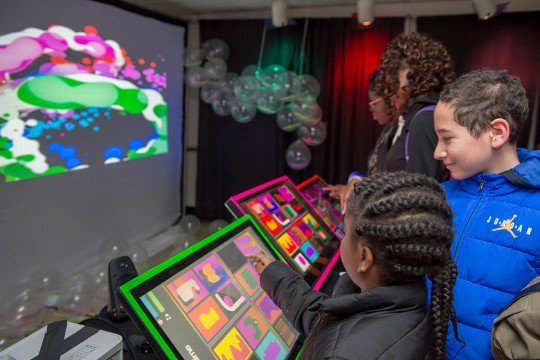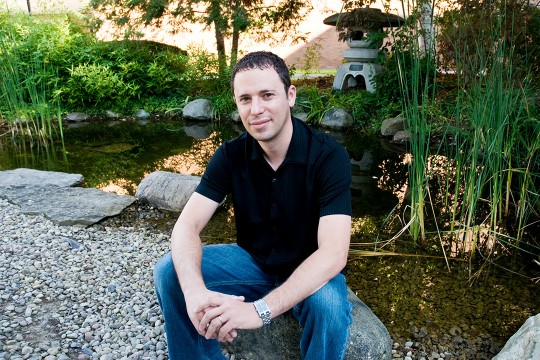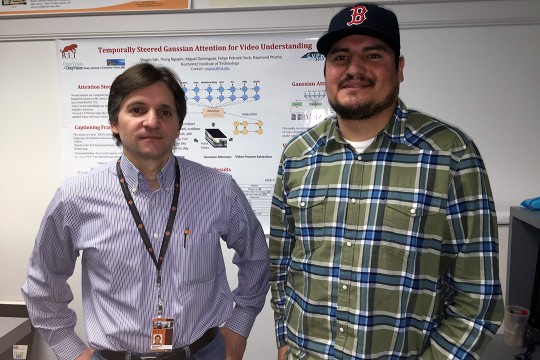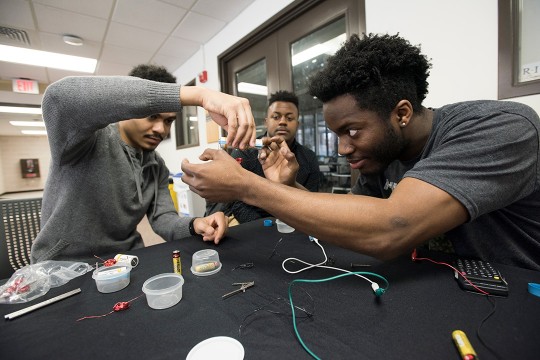News by Topic: Artificial Intelligence
As one of the highest-ranked universities in the nation for computer science, RIT is a hotbed for research on artificial intelligence. Both professors and students alike work on numerous projects to see how AI can be ethically used to improve areas such as energy, medicine, and combatting false information.
-
April 27, 2019
![Students use colorful touchscreens.]()
Surprise spring snow doesn’t deter crowds at Imagine RIT
There’s always something new to experience at the Imagine RIT: Creativity and Innovation Festival, which this year featured more than 400 exhibits, including a human hamster wheel, performances by student ensembles, cutting-edge video games and demonstrations to determine how color can affect your mood.
-
April 17, 2019
![Graphic illustration of man looking at phone while walking on collage of social media posts.]()
Why You Can No Longer Get Lost in the Crowd
Guest essay co-written by Evan Selinger, professor of philosophy, published in The New York Times.
-
April 12, 2019
![Group of 14 people holding awards and smiling.]()
RIT honors researchers
RIT honored researchers who served as principal investigators on active awards in fiscal year 2018 at an April 11 reception. Also recognized were the 20 recipients of Seed Funding Awards and 12 new inductees in RIT’s PI Millionaires.
-
April 6, 2019
![Man sits on rock near pond and garden.]()
Hey Google, sorry you lost your ethics council, so we made one for you
MIT Technology Review talks to Evan Selinger, professor of philosophy, about Google's AI principles.
-
April 1, 2019
![Woman wearing glasses and floral print dress sits at table.]()
Cracking down on poachers with imaging
Elephant and rhino poachers in South Africa can run, but they can’t hide from drones. An imaging system created by a team led by Elizabeth Bondi ’16 automatically detects illegal hunters infiltrating national parks at night. Bondi’s deep learning system alerts the monitoring team who notifies park rangers or law enforcement of a potential threat to the animals under their protection.
-
March 21, 2019
![professor and student in front of poster presentation.]()
Podcast: Using AI to Save the Seneca Language
Intersections: The RIT Podcast, Ep. 11: Artificial intelligence and deep learning have many research applications. Ray Ptucha, assistant professor of computer engineering in RIT’s Kate Gleason College of Engineering, talks with computing doctoral student Robert Jimerson from the Golisano College of Computing and Information Sciences about a project using deep learning systems to help preserve the Native American Seneca language.
-
March 19, 2019
![Head-and-shoulders view of man posing in front of blue banner]()
Patrick Walsh on leadership: Understand personalities and help your people to grow
Syracuse.com features Patrick Walsh '05 (mechanical engineering), co-founder of EagleHawk
-
March 13, 2019
![Head-and-shoulders view of man with glasses]()
New research unlocking the secrets of how languages change
New research is helping scientists around the world understand what drives language change, especially when languages are in their infancy. The results will shed light on how the limitations of the human brain change language and provide an understanding of the complex interaction between languages and the human beings who use them.
-
March 6, 2019
![Three researcher watch hyperspectral camera on roof.]()
RIT researchers developing ways to use hyperspectral data for vehicle and pedestrian tracking
A classic scenario plays out in action films ranging from Baby Driver to The Italian Job: criminals evade aerial pursuit from the authorities by seamlessly blending in with other vehicles and their surroundings. The Air Force Office of Scientific Research (AFOSR) has RIT researchers utilizing hyperspectral video imaging systems that make sure it does not happen in real life.
-
March 1, 2019
![Three researchers standing]()
Native American communities are fighting to preserve endangered languages
WXXI talks to Robbie Jimerson, a computer science doctoral student about the effort to document the Seneca language with the aid of artificial intelligence.
-
February 21, 2019
![logo for RIT intersections: the RIT podcast.]()
Podcast: Protecting us from Fake News
Intersections: The RIT Podcast, Ep. 9: In the digital age, how can you be so sure that the photo, video or audio being shared on social media hasn’t somehow been altered or manipulated? Associate professor of photography Christye Sisson and motion picture science undergraduate student Owen Thompson discuss media forensics and its role in protecting us all from fake news.
-
February 19, 2019
![three students demonstrate how to make a simple motor using everyday materials]()
RIT celebrates National Engineers Week
National Engineers Week takes place this week at RIT, and the university will participate in the annual recognition of engineers’ contributions by hosting a variety of programming for those interested in learning more about what engineers do.






















